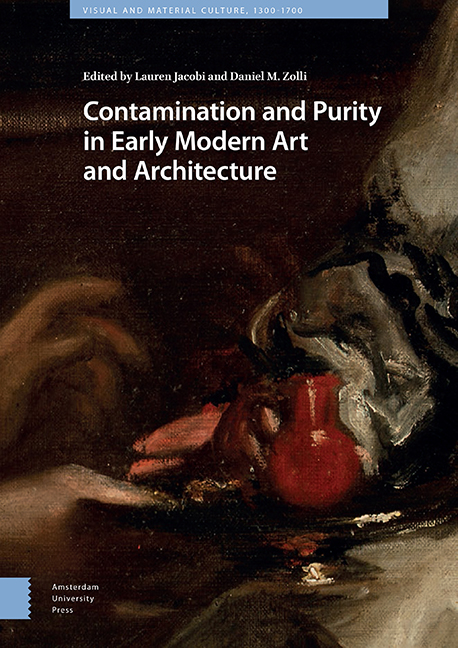Book contents
- Frontmatter
- Contents
- List of Illustrations
- Introduction: Contamination and Purity in Early Modern Art and Architecture
- 1 Generation and Ruination in the Display of Michelangelo’s Non-finito
- 2 The Sacrilege of Soot: Liturgical Decorum and the Black Madonna of Loreto
- 3 Sedimentary Aesthetics
- 4 ‘Adding to the Good Silver with Other Trickery’ : Purity and Contamination in Clement VII’s Emergency Currency
- 5 Tapestry as Tainted Medium: Charles V’s Conquest of Tunis
- 6 Bruegel’s Dirty Little Atoms
- 7 Leakage, Contagion, and Containment in Early Modern Venice
- 8 Contamination, Purification, Determinism: The Italian Pontine Marshes
- 9 Colonial Consecrations, Violent Reclamations, and Contested Spaces in the Spanish Americas
- 10 Contamination | Purification
- Index
6 - Bruegel’s Dirty Little Atoms
Published online by Cambridge University Press: 27 May 2021
- Frontmatter
- Contents
- List of Illustrations
- Introduction: Contamination and Purity in Early Modern Art and Architecture
- 1 Generation and Ruination in the Display of Michelangelo’s Non-finito
- 2 The Sacrilege of Soot: Liturgical Decorum and the Black Madonna of Loreto
- 3 Sedimentary Aesthetics
- 4 ‘Adding to the Good Silver with Other Trickery’ : Purity and Contamination in Clement VII’s Emergency Currency
- 5 Tapestry as Tainted Medium: Charles V’s Conquest of Tunis
- 6 Bruegel’s Dirty Little Atoms
- 7 Leakage, Contagion, and Containment in Early Modern Venice
- 8 Contamination, Purification, Determinism: The Italian Pontine Marshes
- 9 Colonial Consecrations, Violent Reclamations, and Contested Spaces in the Spanish Americas
- 10 Contamination | Purification
- Index
Summary
Abstract
The Scientific Revolution was dirty: ‘now [the sun] shows itself to us as partly impure and spotty,’ Galileo wrote after looking at that celestial body through a telescope in 1612. Like the telescope, the microscope revealed the generally mottled nature of things. This was an aesthetic problem. The revelation of spots, stains, and cavities turned perfectly whole bodies complicated and ugly. Meanwhile, the equally ‘impure and spotty’ theory of atomism began to take hold. But well before the popularization of the telescope and microscope or the admission of atomism to plausibility, the artist Pieter Bruegel the Elder unfurled a ‘dirty’ atomism across panel and paper.
Keywords: atomism, Lucretius, microscope, landscape, Bruegel, Avercamp
Pits and Protuberances
The early modern inventions of vision-enhancing instruments like the telescope and the microscope mucked things up. Reporting on his telescopic observations in a letter of 1612, Galileo wrote: ‘so long as men were in fact obliged to call the sun “most pure and most lucid,” no shadows or impurities whatever had been perceived in it; but now it shows itself to us as partly impure and spotty.’ Like the telescope, the microscope revealed the ubiquitous unevenness of things: ‘The superfice of no Visible is so exquisitely smooth, polite, or equal, as not to contain various Inaequalities, i. e. Protuberant and Deprest parts, or certain (Monticuli and Valleculae) small Risings and Fallings: which in some bodies […] require the detection of the Microscope.’ And the complexity compounds as these parts are discovered to be pregnant with miniscule life: ‘we find in the most solid Bodies, as in Marble itself, innumerable Cells and Cavities that are crouded with such imperceptible Inhabitants, as are too little for the naked Eye to discover.’
The forms deformed by the microscope included the human body. The magnifying glass had already begun to reveal the body's troubling complexity: ‘the most beautiful hand seen through a magnifying glass will seem horrible.’ The microscope only aggravated the situation: ‘if the eye were so acute, as to rival the finest Microscopes […] the sight of us our own selves would affright us; the smoothest Skin would be beset all over with ragged Scales, and bristly Hairs.’
- Type
- Chapter
- Information
- Contamination and Purity in Early Modern Art and Architecture , pp. 207 - 242Publisher: Amsterdam University PressPrint publication year: 2021



